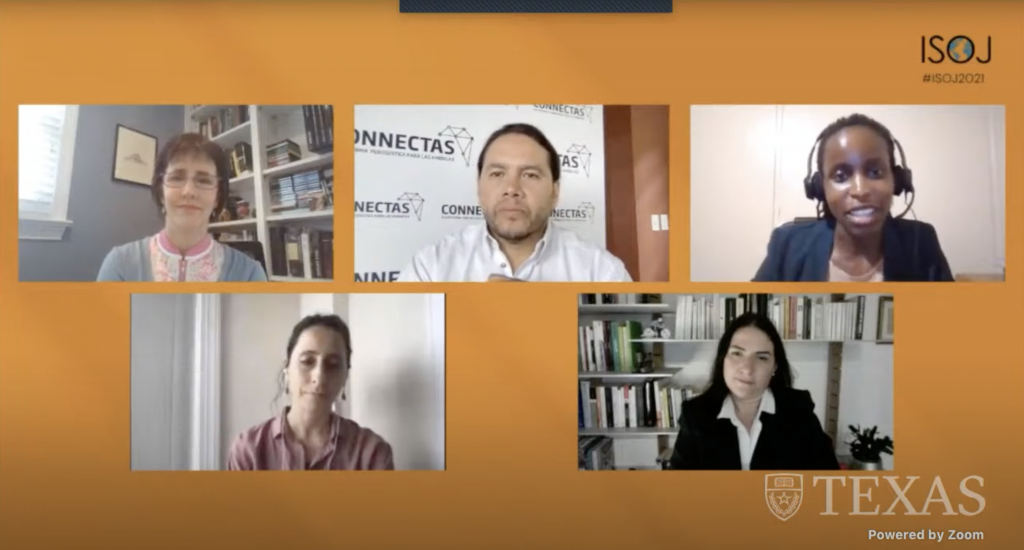April 26, 2021 | Collaboration, Innovation, ISOJ 2021
Collaboration in investigative reporting presents its challenges, but the reward is truthful and well-reported stories for the global community
While collaboration is now popular among investigative journalists, they have traditionally been the ultimate newsroom lone wolfs. Journalists in the past have been known to hoard and conceal information to prevent the next reporter from stealing the story. But, due to this, “journalists were missing some of the biggest stories of our time, stories that transcend borders, newsrooms and our own egos,” said Marina Walker Guevara, executive editor at the Pulitzer Center, as she opened the first panel of the International Symposium on Online Journalism (ISOJ).
For the second time in ISOJ’s 22-year history, the University of Texas at Austin’s Knight Center for Journalism in the Americas hosts ISOJ 2021 completely online. To watch this panel and other sessions throughout the week, click here.
Scilla Alecci, investigative reporter and videographer for the International Consortium for Investigative Journalism (ICIJ), joined Walker in the panel discussion. She defined radical sharing as “a philosophy, a way of life, but also a practical term,” it is the opposite of the lone wolf reporter, “the idea that we want to work in a newsroom that goes beyond borders.”
There is only one goal and that is publishing a story for the global public, she said. With the help of technology, sharing information and collaborating with global reporters has become more of a convenience than a struggle in recent years. The key to radical sharing is trust, between both the reporters and their global audience.
Watching the scale of global collaboration with the Panama Papers is what inspired Alia Ibrahim to create the collaboration Daraj. The people of Lebanon deserve to receive international news, and not have to wait months for the stores to reach them, she said. She spoke about a case where collaboration between reporters in Lebanon and European partners is what exposed one of the richest men in Lebanon while the country has been facing a huge financial crisis. “Collaboration is another dimension of working, really, and the quality of the stories we ended up producing was simply not possible outside this collaboration with OCCRP. I like to believe the impact is what gives us the motivation […] and it has been an incredibly rewarding experience.”
Carlos Eduardo Huertas joined the panel from Colombia, where he founded the platform and network of investigative reporters Connectas. “The Americas are full of stories that go beyond the political borders of a country, […] the media is typically focused on the power dynamics of the capitals and usually only touch the rural areas in the instance of serendipity,” Huertas said, as he explained the natural need for a collaborative platform in Latin America.
Connectas promotes better journalism, where collaboration is a positive experience, but it is not the purpose; the purpose of collaborative reporting is the audience, and the communities you serve, he said. Huertas explained how his organization facilitates truthful reporting: “We work with the younger generation to strengthen their capacities and abilities as collaborators.” Working with the younger generation, he said, has given Connectas the ability to facilitate a group that is built on trust and will make for a sustainable community of collaborative reporters.
Purity Mukami shared her experience of reporting on career-defining stories from Kenya during a global pandemic, and the challenges she faced joining a global team through ICIJ. She works as a reporter and data scientist for Finance Uncovered and The Elephant. The first and only physical meeting with the African team for ICIJ happened about a month before the first case of COVID-19 hit Kenya, which was key in establishing relationships within the team. Mukami described her experience with joining a reporting team for the first time as a bit overwhelming, but with the support of the project leaders and of her colleagues, she found comfort in working as a part of a global team.

The panelists moved on to offer tips for the most challenging aspects of collaborative reporting. Scilla described her challenges as a variety of things from organization to communication, and even the uncontrollable issue of time zones. “I try to schedule as much as I can, even if it is only for a few minutes,” Alecci said. “The scheduled and recurring time to connect with people is key when you have to adapt to the geographical to cultural challenges.”
“Collaborative work poses great responsibility, it’s like a body with many extensions. […] The key is clarity in every aspect, you need to be clear about deadlines, about responsibility and collaborations,” Huertas added.
“Today for us, being investigative journalists in the Arab world, you have no idea what it means to feel like we are not orphans like we are not on our own,” Ibrahim said. “We feel that we’re not that vulnerable. We compromised a little bit of our time or our freedom by running our newsroom but it’s that compromise that is totally worth it.”
You can watch the full panel in English or Spanish on YouTube. Join us at isoj.org for more #ISOJ2021.

